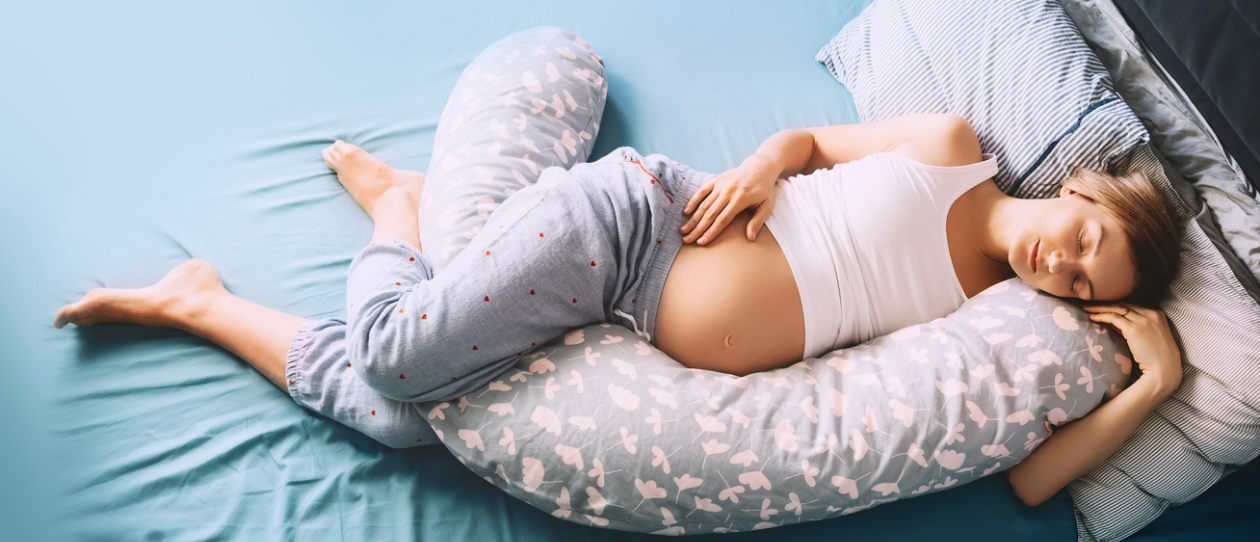
- Health hub/
- Resources for Pregnancy and Preconception/
- A pregnant woman's guide to better sleep


Many expectant mums suffer from broken sleep during pregnancy. Discover why and how to get a better night’s sleep with a few simple tips.
Pregnancy is often associated with happiness and anticipation, yet a lack of sleep, particularly in the third trimester can affect a mum-to-be’s energy. Getting a good night’s sleep is important when you’re pregnant for both you and your baby, although it’s common for pregnancy to interfere with and disrupt sleep, so that you might wake up more and not sleep as deeply.
How pregnancy affects sleep also changes during each trimester.
During the first trimester: you may actually sleep more than usual in weeks one to 12 of a pregnancy. The need for sleep during this time tends to increase in response to feeling tired as your body works to nurture and nourish the developing baby, and you may find you need to spend more time resting or sleeping.
During the second trimester: a number of different things can make sleep more challenging in this trimester, including having more unusual or vivid dreams than usual, suffering leg cramps, and experiencing a blocked nose due to pregnancy-related hormonal changes. Some women also start to snore for the first time in their lives at this stage of pregnancy, which can disrupt sleep as well.
During the third trimester: sleeping well may become increasingly difficult due to a range of factors including indigestion, needing to get up to go to the toilet frequently, disruptive leg movements, and simply the fact that baby’s growing size can make it difficult to find a comfortable sleeping position. From 28 weeks, it’s also important that you sleep on your side, with some doctors recommending sleeping on the left side in particular to improve circulation and allow for optimal blood flow to baby, the uterus and your kidneys. If you’ve always been a ‘stomach’ or ‘back’ sleeper, getting used to sleeping on your side can make sleeping soundly even more challenging.
Better sleep with a bump
Despite how consistently and commonly poor sleep occurs among expectant mums, it’s important to do what you can to get a good night’s sleep – and not just for your mood.
According to some research, a link may exist between women who get less than six hours’ sleep a night during the third trimester and experiencing longer labours. Plus, getting adequate sleep during the first trimester may impact your health in the third trimester.
Here are a few things you can do to help improve sleep during pregnancy.
1. Prioritise sleepOne way of doing this is to be consistent with your sleep schedule – try to go to bed and wake up at the same time every day. Sticking to a bedtime routine that relaxes you, and making your bedroom inviting and restful, can also help. You can catch up on sleep by having a daytime nap if you need to, but try to keep naps short to avoid them affecting your sleep at night.
2. Move itAs well as improving your circulation, endurance, fitness, mood, back strength and weight control (remembering that it’s completely typical for women of healthy weight to gain up to 15kg during pregnancy), exercise can also improve sleep during pregnancy. As well as avoiding exercise in the hour or two before bedtime, it’s important to note that the changes your body undergoes as pregnancy progresses will also affect your ability to exercise and may require you to make some modifications to your exercise routine. Talk to your doctor for more information.
3. Take steps to avoid indigestion and multiple overnight toilet tripsAvoiding spicy foods and limiting rich ones during dinner may reduce the chance of indigestion and heartburn waking you up in the middle of the night. Raising your head by sleeping on more pillows may also help. Make a conscious effort to avoid drinking too much in the evening and remember to go to the toilet just before bed, which may help to reduce the number of toilet trips you need to make during the night.
4. Cut back on caffeineThis is particularly important if you find that moving your legs during sleep is keeping you awake. Reduce the number of caffeinated drinks, like coffee and tea that you drink, and always restrict them to morning and early afternoon.
5. Use a pregnancy pillowThese come in many different shapes and sizes, but essentially they’re designed to provide support for various pregnancy-safe sleeping positions. As well as making sleep more comfortable and encouraging longer periods of sleep, they can be particularly useful in the third trimester when getting a good night’s sleep becomes more challenging.




